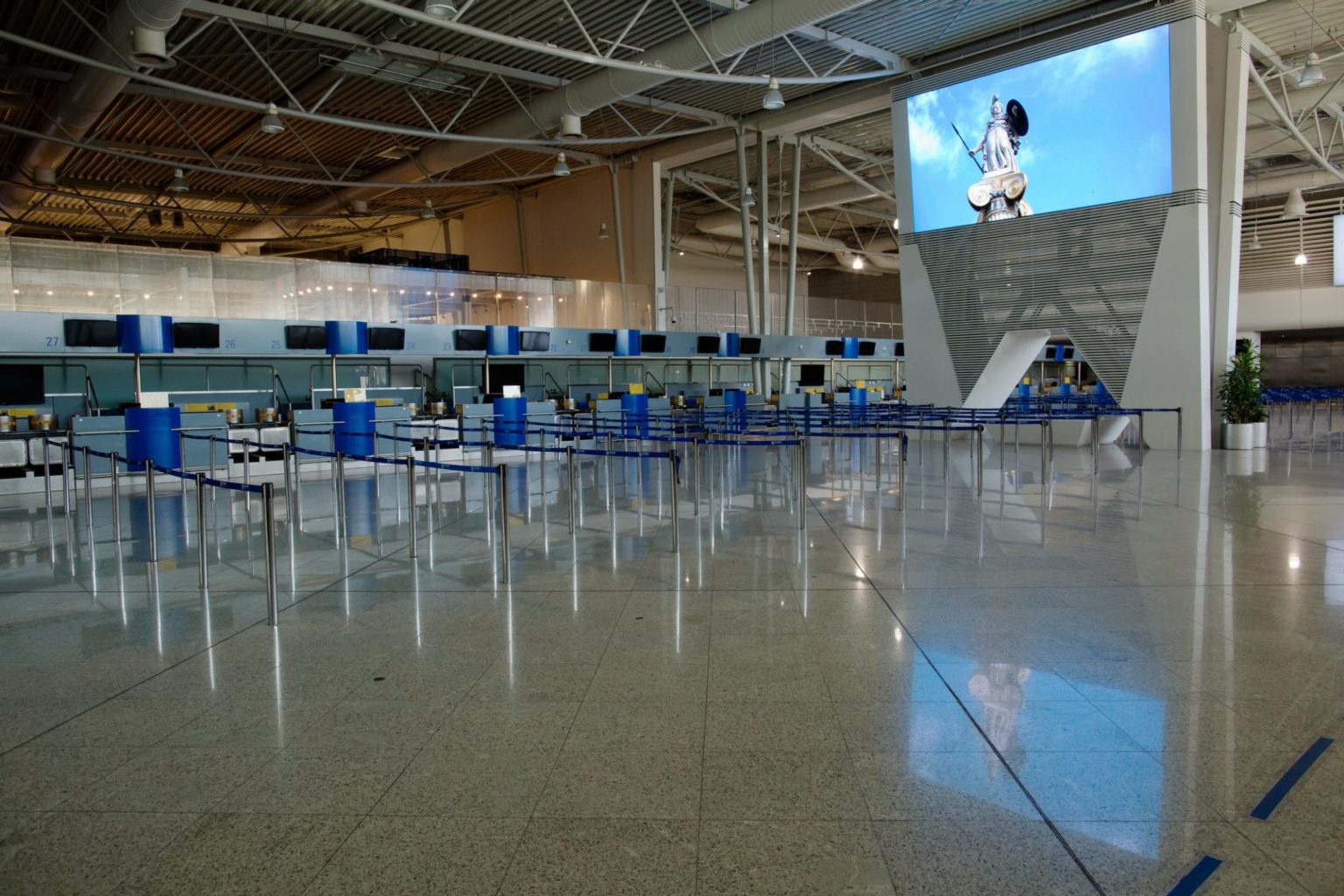They were to travel to Thessaloniki, on Aegean’s first domestic flight after the lockdown of almost two months. On the morning of Monday, 18 May, travellers gathered in the departure lounge of Athens International Airport, instinctively raised their mobile phones. They were trying to capture the sense of standing alone in such a vast space – it was so vacant that they could hear their voices echoing.
They all put on mandatory face masks and followed the boarding procedure separated in small groups. In the aircraft cabin, flight attendants handed out disinfectants and after they fastened their seatbelts they found no magazines or brochures on the back of the front seat. It was imperative to limit contact with people and objects as much as possible. The plane was full, except for the three last seat rows. These were to remain vacant in every flight, to allow isolation of a potential case. The new, post-Covid19 era was airborne.
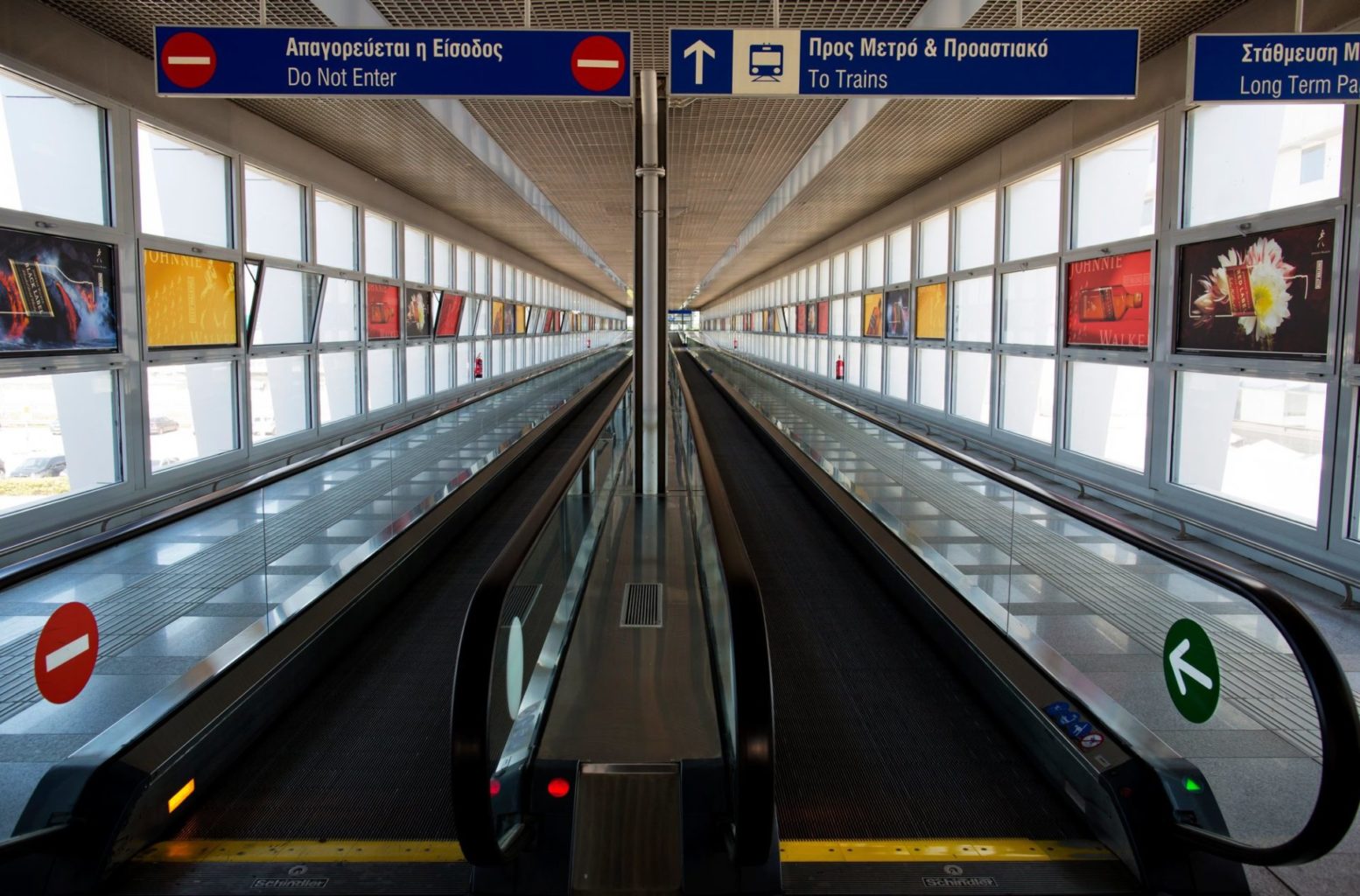
On the afternoon of the same day, after the end of the Athens Stock Exchange trading session, the chairman of Aegean Airlines, Eftichis Vasilakis, talked to investors and analysts by teleconference. There is no official statement as to what was discussed, but the alleged conversation reveals the severity of things. Mr Vasilakis described that in the months March and April there was a 90% drop in flights and 98% in passenger traffic. In the 2nd quarter, the monthly cost for the company stood at Euro 26-28 million, with the airline using up a liquidity of Euro 40 million per month. According to the good scenario, Aegean’s flying activity will gradually reach 25% in July and 45-50% in September.
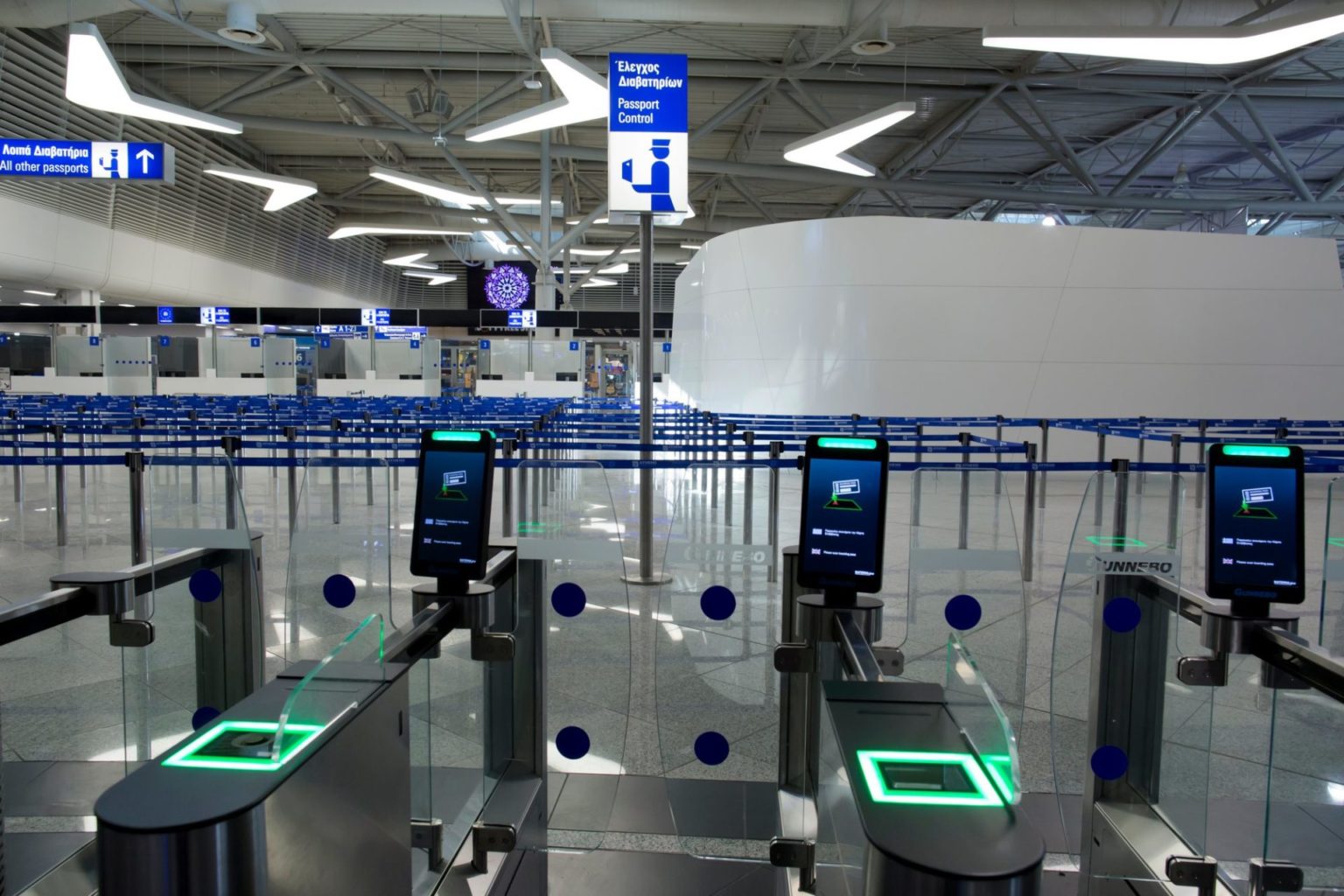
we need the same support as our competitors, we are not asking the state to bear the entire burden of the crisis, but to help us in our effort
As regards state aid, Mr. Vasilakis has allegedly said that the company must be supported, following the practice of other EU governments, claiming that “we need the same support as our competitors”. As he said, “we are not asking the state to bear the entire burden of the crisis, but to help us in our effort”. He also ruled out any nationalisation of the company. State aid measures could either involve loans guaranteed by the state or job funding programs – 70% of personnel have been included in the furlough programme of the state.
We have already provided airlines with a plan to suspend the payments of their fees and facilitated them offering the transfer of some payments in the future, while a solution was also found for the problem of tickets that had been issued. We, therefore, provide overall support to the industry
We asked the Minister of Transport and Infrastructure, Kostas Karamanlis, to comment on the plan of the government for the country’s largest air carrier. “The aviation industry has companies that offer a great deal to the Greek economy and we are decided to protect it. It was the first industry hit by this crisis and it is certain that it will be tried hard again in the future”, he noted. He did not want to reveal more. “We have already provided airlines with a plan to suspend the payments of their fees and facilitated them offering the transfer of some payments in the future, while a solution was also found for the problem of tickets that had been issued. We, therefore, provide overall support to the industry”, he said.
Lufthansa and Alitalia
Last week, the Spiegel wrote that the German government finally agreed to rescue Lufthansa. The state will participate in the company with a 25% holding and will also hold two positions in the supervisory committee. The overall support package to the airline amounts to Euro 9 billion. Nonetheless, the plan is subject to shareholders’ approval during an extraordinary general meeting. We asked Lufthansa about the day after. The company spokesperson, in a written reply, quoted an extract from the speech of the Group’s top executive, Carsten Spohr, during the annual meeting of shareholders of 5 May.
We expect that the global demand for air travel will not have the dynamic increase of previous years. Travelling behaviour will change, both in recreational and business travel. We anticipate a global transformation of civil aviation
“After the crisis, the airline will be a different and smaller Lufthansa. Our fleet will be reduced by about 100 aircraft. We can avoid lay-offs, keeping as many colleagues as possible onboard using innovative part-time models and our unique blend of Lufthansa solidarity,” said Spohr. He also added: “We expect that the global demand for air travel will not have the dynamic increase of previous years. Travelling behaviour will change, both in recreational and business travel. We anticipate a global transformation of civil aviation”.
Lufthansa is not the only one. The Italian state offered Euro 3 billion to support Alitalia, causing a stir about the amount being disproportionately larger than the overall rescue package for households and businesses, in a country that suffered great losses after the pandemic. “The ratio is about Euro 300,000 for each Alitalia employee”, was the backlash of Italian Media. The main problem is that the directive of the European Commission specifies that state aid should be provided to healthy businesses affected by the crisis. However, Alitalia had issues even before Covid19.
Without immediate financial support, aviation will collapse and it will take years for the global economy to restart
In our communication with the representative of the International Air Transport Association, the almighty IATA was very realistic about the matter of state aid to airlines. “Without immediate financial support, aviation will collapse and it will take years for the global economy to restart”, its representative wrote in the relevant e-mail. It is currently estimated that 2.7 million people around the world work in aviation and 66.5 million are indirectly employed in the industry, generating $2.7 trillion for the global economy.
“Every job secured in an airline, keeps alive 24 more employees”, according to IATA’s representative. According to the latest report of the association, the Covid19 crisis is expected to cause airline losses of $314 billion, an amount which translates to a 55% drop of passenger revenue and 48% drop of flying activity, compared to 2019.
400 passengers per day
Back in Athens, the figures of Athens International Airport for the two-month pandemic crisis, are revealing. In the first two months of 2020, more than 2.8 million passengers travelled through the airport of Athens. In March, passenger traffic dropped to 640,000 passengers and in April – during the complete lockdown – instead of the 2 million passengers expected, only 21,759 persons travelled through Athens International Airport. There were days that less than 400 passengers travelled. In April, passenger traffic was reduced by 98.9% compared to the same month last year. In essence, the airport of Athens was closed.
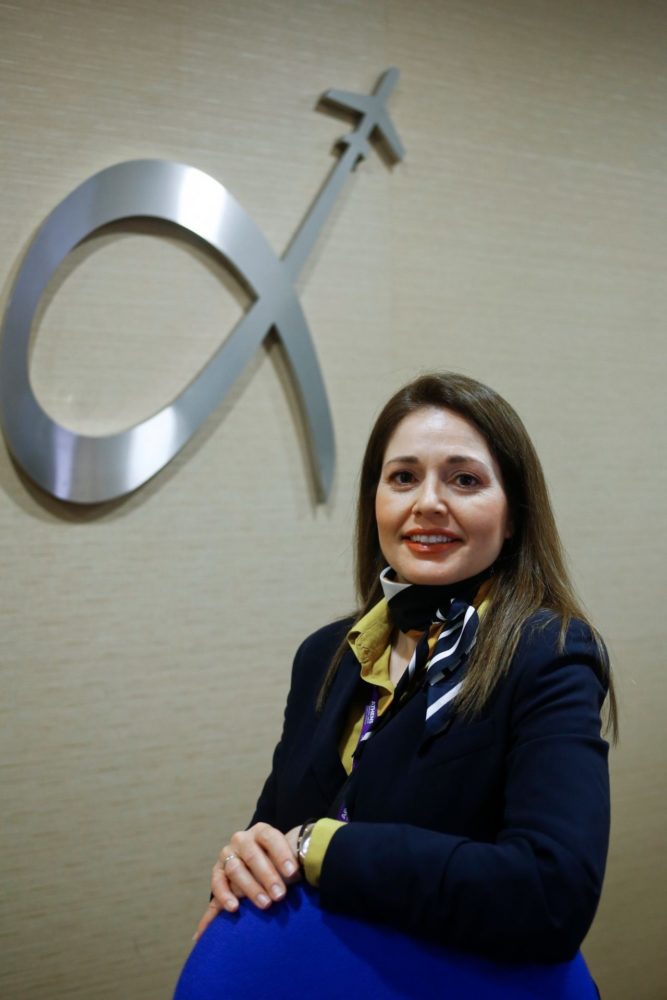
At this time, at the beginning of the summer season, the airport would be bursting with life. Millions of visitors from around the world would arrive in Athens and we would be ready to welcome them
“At this time, at the beginning of the summer season, the airport would be bursting with life. Millions of visitors from around the world would arrive in Athens and we would be ready to welcome them”, said Maria Iatrou, Senior agent at Airport Information. “The airport was so empty only in the days before its inauguration, in 2001”, according to Christina Kanaki, Terminal Operations Supervisor. “Only, back then, the feelings were the opposite: there was joy and suspense”.
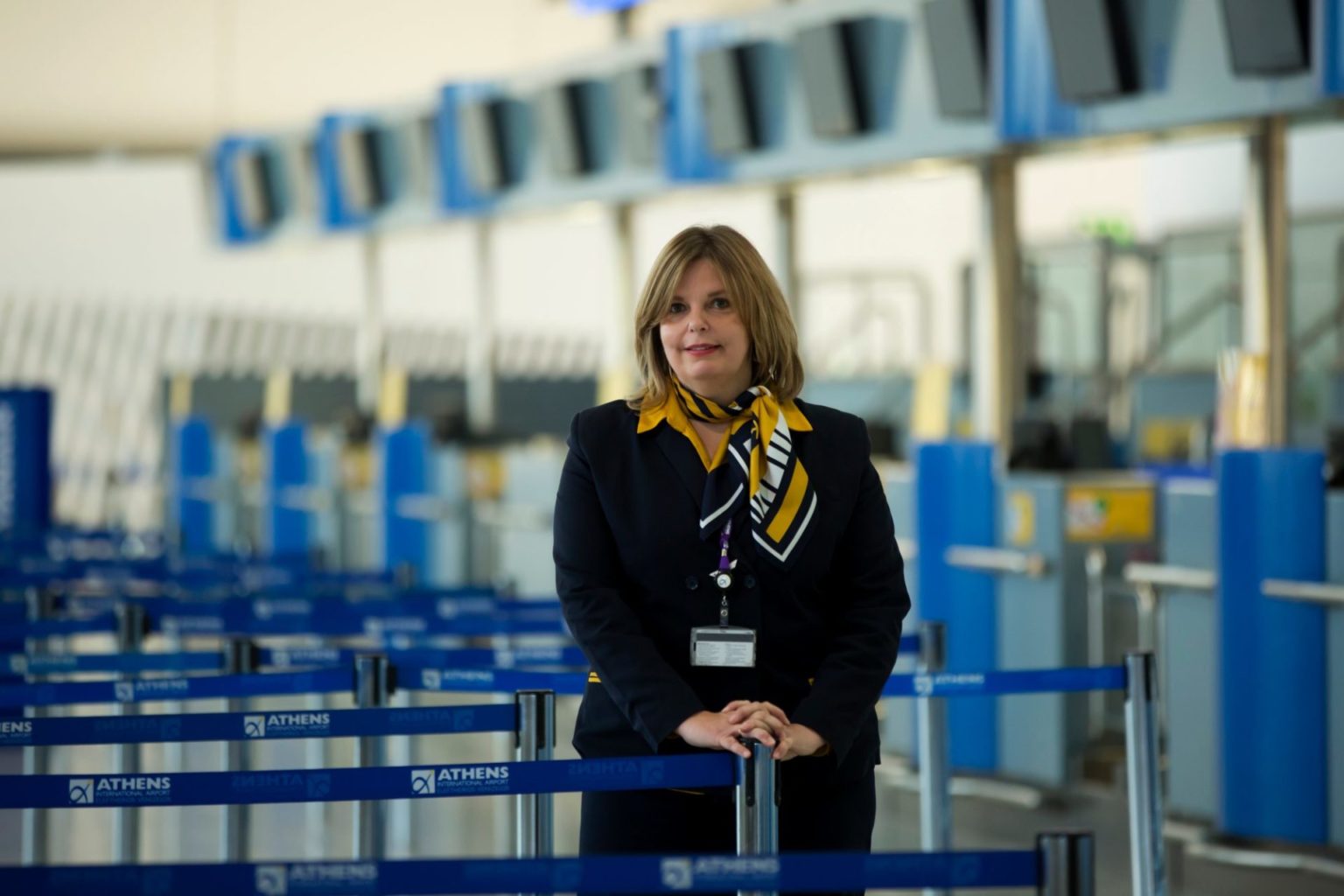
Testing and quarantine
What will the day after be like, in practice? According to the government’s plan, in June all international flights will land in Athens International Airport, but there will be exceptions for countries with negative epidemiological characteristics. On the 1st of July direct international flights to other airports of the country will be gradually allowed. “We are currently discussing another proposal too, which does not concern Greece only but the European Union as a whole, in order to find common ground and the right method for temperature checks in airports. Our goal is to find the golden ratio between free transport and public health protection”, said the Minister of Transport, Mr. Karamanlis.
The proposals of the Greek government to the European Commission included the testing of passengers 72 hours before flight, which was not considered in the end. International flight passengers arriving today in Athens International Airport are subject to a lab test and accommodated in a hotel for one night. Passengers tested positive for coronavirus, are quarantines, while those tested negative will have to stay for 14 days at the address they will declare.
After the lift of the flight ban, on 15 June, according to the Minister of Tourism, Charis Theocharis, foreign visitors will not be required to take the test nor be subject to quarantine. Airport testing will be carried out on a sampling basis. According to the plan, arrivals will be separated in four categories, depending on the epidemiological characteristics of their country of origin. Based on the above separation, more or fewer tests will be carried out at the terminal. It is not yet determined what will happen with charter flights from the UK or American tourists.
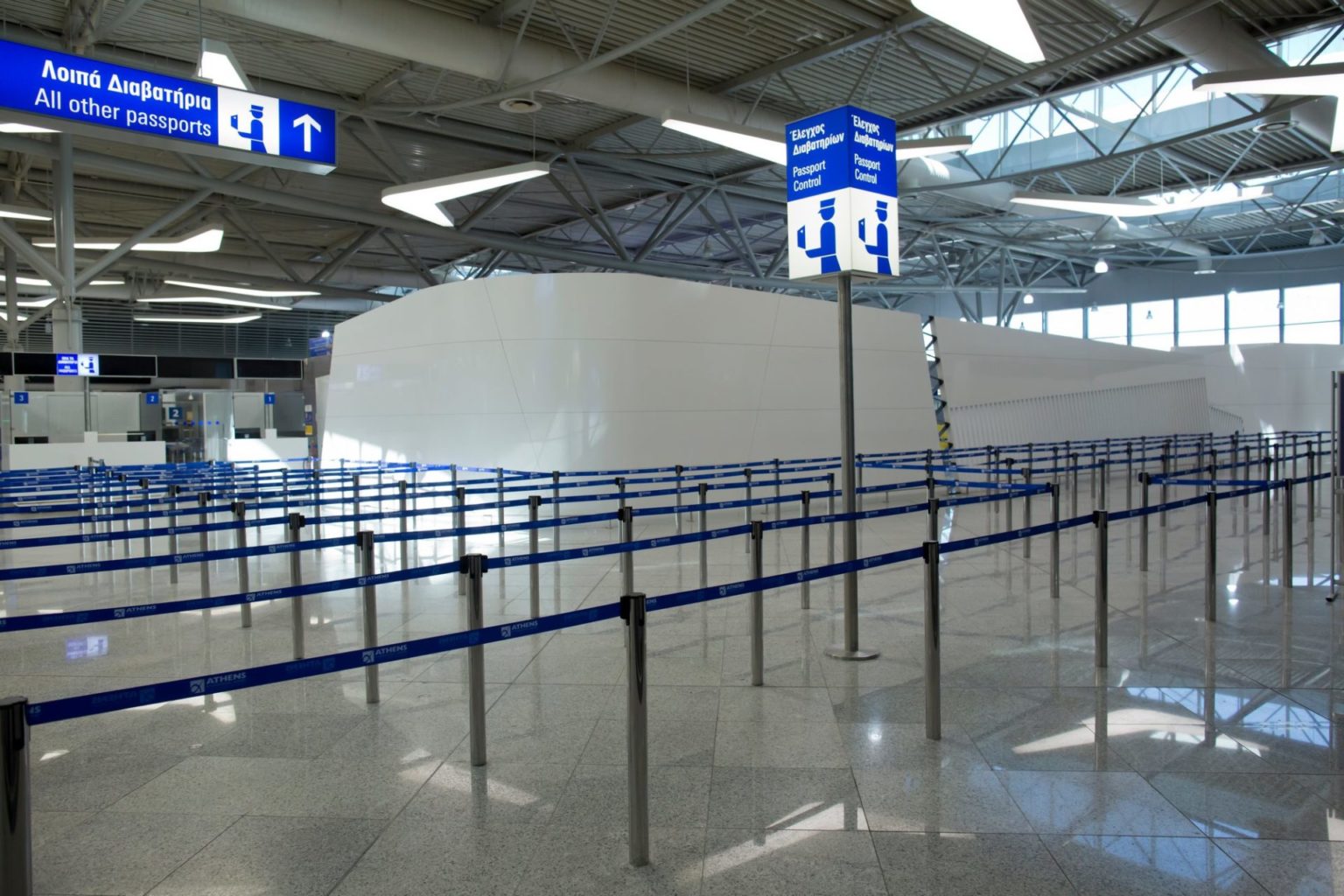
The middle row “nightmare”
Experts describe that the day after for aviation will have futuristic and dystopian features at the same time. The IATA recommended temperature checks for each individual passenger, limited movements in the aircraft during the flight, regular disinfection of the cabin, and offering only the meals necessary with the minimum contact possible between passengers and crew. Designers have suggested measures that included even the placement of plexiglass panels between passengers. As regards the most crucial question of all, namely whether aircraft middle row seats will remain vacant, IATA stated that this is not mandatory.
Physical separation in the aircraft cabin is unnecessary and ineffective, given the combined measures taken by airlines, such as the use of an upgraded filter, proper cleaning and the responsible behavior of passengers, namely the use of masks for the entire flight
Airlines for Europe (A4E) is the commercial association of the 16 largest airlines in Europe. In a written statement, the representative of A4E, Paula Uriz, stated: “Physical separation in the aircraft cabin is unnecessary and ineffective, given the combined measures taken by airlines, such as the use of an upgraded filter, proper cleaning and the responsible behavior of passengers, namely the use of masks for the entire flight”. As regards the crucial “middle row” question, she was specific: “The “vacant middle row seats” measure is not viable, because it will reduce the number of passengers down to 50-60% of the aircraft’s capacity. Due to high operating and other fixed costs, airlines need a seat occupancy of at least 77% in each flight, to cover these costs”.
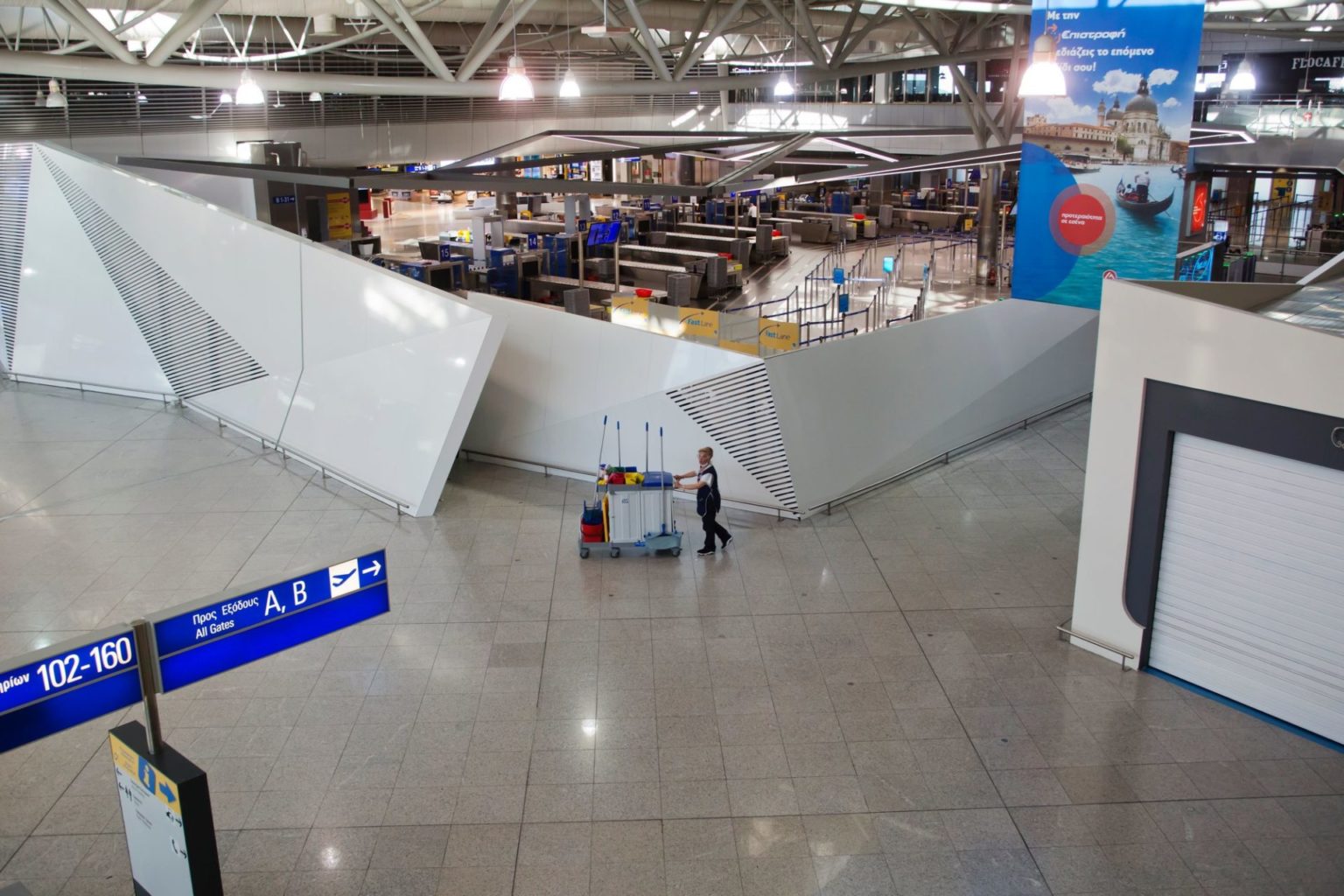
For now, we do not apply the vacant-next-seat policy, as the protection offered by mask use is sufficient. Due to low occupancy rates, seats are distributed in the entire cabin
When asked the same question, the spokesperson of Lufthansa replied: “For now, we do not apply the vacant-next-seat policy, as the protection offered by mask use is sufficient. Due to low occupancy rates, seats are distributed in the entire cabin”. She also added that aircraft are equipped with powerful filters that prevent the circulation of pollutants, such as dust, bacteria and viruses, in the air of the cabin. “This concerns 40% of the air. The rest is added from the external air. In practice, the cabin is cleaner than the air inhaled by people on earth”, she noted. “Furthermore, airflow is top-to-bottom and not along the cabin and corresponds to the so-called “smooth flow” of an operating room”.
Airline tickets
Finally, what will happen to the cost of air travel? The spontaneous reply is that ticket prices will be increased, because of the social distancing measures that airlines will have to implement. Yet, this is not the rule. Seth Kaplan, an aviation policy analysts and co-host of the podcast “Airlines Confidential” described to Lonely Planet that ticket cost follows the rules of supply and demand. “At the moment, demand has clearly dropped – which normally means reduction of fare – yet, at the same time, airlines also reduce the supply of seats – which causes an increase of fare”, said Kaplan.
“Due to the financial impact of the pandemic, people in the direct future will not be able to afford high prices for airline tickets. Therefore, airlines will not be able to charge what they would like to, but will have to charge what the passengers can pay, instead. In other words, airlines will not determine the prices on their own”. He added that, it is also possible for airlines to realise that the demand is indeed low, but is steady – not may will travel, but those who do, are willing to pay. Most airlines, according to Kaplan, are not built to serve small numbers of flights. Those that will survive the day after, will definitely to fill the vacant seats.

